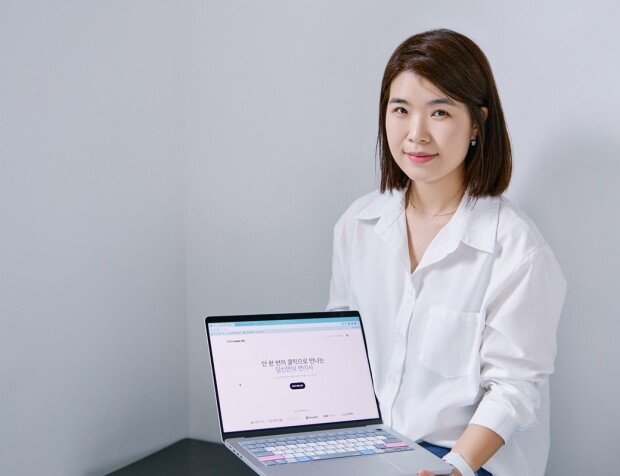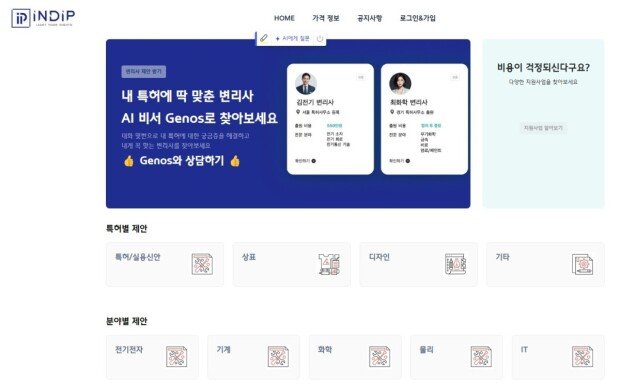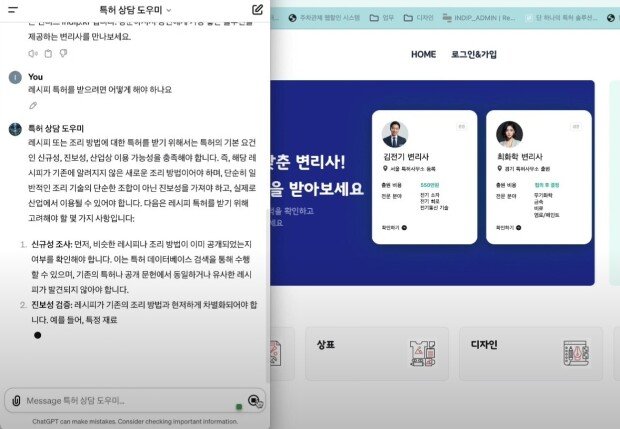INDIP: "We'll Help You Find Patent Attorneys to Manage Your Technology Patents and Trademarks"
INDIP: "We'll Help You Find Patent Attorneys to Manage Your Technology Patents and Trademarks"
Posted December. 30, 2024 10:49,
Updated April. 18, 2025 11:10
For both individuals and businesses, intellectual property (IP) such as technology or design patents, copyrights, and trademarks for products, brands, or characters must be protected as unique "rights" in order to avoid infringements. Patent attorneys, or intellectual property lawyers, can assist startup CEOs and small business owners who may lack the required legal knowledge or experience in preventing potential losses or disadvantages related to IP.
However, it is often challenging for individuals or businesses wanting to protect their intellectual property to find the right patent attorney to meet their needs. To address this issue, INDIP's CEO Bo-nam Sohn, a former patent attorney, has founded a platform startup designed to connect clients with patent attorneys. The increasing number of disputes over patents, copyrights, and trademarks highlight the significance of INDIP's work.

What is INDIP?
INDIP is a platform that connects customers with professional patent attorneys in the field of intellectual property rights. It provides information about the attorneys who specialize in patents, trademarks, designs, and other IP-related expertise, enabling individuals or businesses to find the right expert quickly and efficiently.
What inspired you, as a practicing patent attorney, to establish INDIP?
Through my experience representing large corporations as a patent attorney and evaluating the technology financing for SMEs, I observed the challenges that are faced by small businesses and individual clients in finding suitable patent attorneys. To address this asymmetry in IP-related information, I established INDIP in 2023, to connect customers with professional patent attorneys effectively by using patent data. Currently, INDIP offers information about the active patent attorneys in Korea, with over 200 registered members.
Who can benefit most from INDIP?
INDIP is especially useful for SMEs and startups that lack specialized knowledge or personnel, to manage their intellectual property. In practice, these groups actively utilize the platform to connect with the patent attorneys who are relevant to their technology or business areas, facilitating the effective acquisition and management of IP.
What sets INDIP apart from similar platforms?
INDIP makes use of extensive patent data to analyze the specialties of attorneys, and uses this information for matching them with customers. Unlike conventional methods that rely on advertisements or personal recommendations, INDIP's data-driven approach ensures a more precise match.

In addition to attorney matching, INDIP provides IP classes and consulting services. These services, which deliver essential education and consultations related to intellectual property management, are targeted at small business owners, startups, aspiring entrepreneurs, and freelancers, to enhance their IP management capabilities.
Recently, you introduced GENOS, an AI-powered service. Could you elaborate on this?
GENOS is Korea's first LLM (Large Language Model)-based generative AI-powered patent consultation assistant. It offers real-time consultations, guides clients through the patent application process, and provides preliminary reviews and advice on technical documents. GENOS simplifies the complex patent application process, assisting clients in managing their IP tasks. As a pioneering service in Korea, we are now aiming to refine it further, ultimately setting a global standard for IP management.

Could you share an example of the IP management issues that lead to challenges for patent holders?
There are countless examples of IP mismanagement that cause difficulties. For instance, delays in patent applications can lead to a competitor claiming precedence, or a poorly drafted patent application can make it challenging to enforce one’s rights. While confidentiality limits discussions on the specific details, one memorable case involved a client who received a warning notice for infringing the "GripTok" trademark. GripTok, an accessory attached to smartphones, became a subject of controversy when the trademark owner sent warnings to small businesses that were selling similar products under the same name. After INDIP connected the client with a suitable patent attorney, the issue was resolved amicably.
What is your market position domestically, and are there plans for an international expansion?
Since it was launched officially just last year, INDIP is still in its early stages. Establishing a foothold in the market is our primary goal, so our market share is not yet a significant focus. By operating within the traditional and conservative legal service domain, we aim to expand gradually. Domestically, INDIP currently collaborates with small-scale patent offices with fewer than five employees and individual patent attorneys. Internationally, our network is focused on markets like the US, Japan, and Southeast Asia, where Korean clients frequently operate.
What kind of support have you received from the SBA (Seoul Business Agency)?
Last October, we participated in the New York Global IR Pitch event, supported by the SBA and Pen Ventures Korea, where we receiving guidance for a global market expansion. Over a three-day program in New York, we attended workshops and discussions on accounting, HR, and investments, gaining essential knowledge for entering the US market. It was also an excellent opportunity to promote INDIP through two IR pitches we delivered to local stakeholders.
What challenges or concerns do you face as a platform startup CEO?
Like other professional service platforms, INDIP is faced with its share of challenges. While the customer feedback has been positive, some industry organizations claim that platforms like INDIP may undermine the quality of IP legal services by driving up the price competition. Persuading these groups remains difficult, but my commitment to addressing our clients' challenges with technology as a patent attorney remains steadfast.
What is INDIP's ultimate goal or vision?
Our goal is clear: to bridge the gap in IP-related information by connecting those clients seeking intellectual property rights with the right IP professionals. We aim to lead with innovations in IP creation and management, becoming an IP hub not only in Korea but also globally.
by Moon-gyu Lee (munch@itdonga.com)
However, it is often challenging for individuals or businesses wanting to protect their intellectual property to find the right patent attorney to meet their needs. To address this issue, INDIP's CEO Bo-nam Sohn, a former patent attorney, has founded a platform startup designed to connect clients with patent attorneys. The increasing number of disputes over patents, copyrights, and trademarks highlight the significance of INDIP's work.

Bo-nam Sohn, CEO of INDIP
What is INDIP?
INDIP is a platform that connects customers with professional patent attorneys in the field of intellectual property rights. It provides information about the attorneys who specialize in patents, trademarks, designs, and other IP-related expertise, enabling individuals or businesses to find the right expert quickly and efficiently.
What inspired you, as a practicing patent attorney, to establish INDIP?
Through my experience representing large corporations as a patent attorney and evaluating the technology financing for SMEs, I observed the challenges that are faced by small businesses and individual clients in finding suitable patent attorneys. To address this asymmetry in IP-related information, I established INDIP in 2023, to connect customers with professional patent attorneys effectively by using patent data. Currently, INDIP offers information about the active patent attorneys in Korea, with over 200 registered members.
Who can benefit most from INDIP?
INDIP is especially useful for SMEs and startups that lack specialized knowledge or personnel, to manage their intellectual property. In practice, these groups actively utilize the platform to connect with the patent attorneys who are relevant to their technology or business areas, facilitating the effective acquisition and management of IP.
What sets INDIP apart from similar platforms?
INDIP makes use of extensive patent data to analyze the specialties of attorneys, and uses this information for matching them with customers. Unlike conventional methods that rely on advertisements or personal recommendations, INDIP's data-driven approach ensures a more precise match.

INDIP website
In addition to attorney matching, INDIP provides IP classes and consulting services. These services, which deliver essential education and consultations related to intellectual property management, are targeted at small business owners, startups, aspiring entrepreneurs, and freelancers, to enhance their IP management capabilities.
Recently, you introduced GENOS, an AI-powered service. Could you elaborate on this?
GENOS is Korea's first LLM (Large Language Model)-based generative AI-powered patent consultation assistant. It offers real-time consultations, guides clients through the patent application process, and provides preliminary reviews and advice on technical documents. GENOS simplifies the complex patent application process, assisting clients in managing their IP tasks. As a pioneering service in Korea, we are now aiming to refine it further, ultimately setting a global standard for IP management.

Generative AI-based patent consultation service
Could you share an example of the IP management issues that lead to challenges for patent holders?
There are countless examples of IP mismanagement that cause difficulties. For instance, delays in patent applications can lead to a competitor claiming precedence, or a poorly drafted patent application can make it challenging to enforce one’s rights. While confidentiality limits discussions on the specific details, one memorable case involved a client who received a warning notice for infringing the "GripTok" trademark. GripTok, an accessory attached to smartphones, became a subject of controversy when the trademark owner sent warnings to small businesses that were selling similar products under the same name. After INDIP connected the client with a suitable patent attorney, the issue was resolved amicably.
What is your market position domestically, and are there plans for an international expansion?
Since it was launched officially just last year, INDIP is still in its early stages. Establishing a foothold in the market is our primary goal, so our market share is not yet a significant focus. By operating within the traditional and conservative legal service domain, we aim to expand gradually. Domestically, INDIP currently collaborates with small-scale patent offices with fewer than five employees and individual patent attorneys. Internationally, our network is focused on markets like the US, Japan, and Southeast Asia, where Korean clients frequently operate.
What kind of support have you received from the SBA (Seoul Business Agency)?
Last October, we participated in the New York Global IR Pitch event, supported by the SBA and Pen Ventures Korea, where we receiving guidance for a global market expansion. Over a three-day program in New York, we attended workshops and discussions on accounting, HR, and investments, gaining essential knowledge for entering the US market. It was also an excellent opportunity to promote INDIP through two IR pitches we delivered to local stakeholders.
What challenges or concerns do you face as a platform startup CEO?
Like other professional service platforms, INDIP is faced with its share of challenges. While the customer feedback has been positive, some industry organizations claim that platforms like INDIP may undermine the quality of IP legal services by driving up the price competition. Persuading these groups remains difficult, but my commitment to addressing our clients' challenges with technology as a patent attorney remains steadfast.
What is INDIP's ultimate goal or vision?
Our goal is clear: to bridge the gap in IP-related information by connecting those clients seeking intellectual property rights with the right IP professionals. We aim to lead with innovations in IP creation and management, becoming an IP hub not only in Korea but also globally.
by Moon-gyu Lee (munch@itdonga.com)







